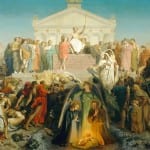Loneliness Going Viral, Again.

It’s becoming popular to recognize and ‘tweet’ about what wisdom would have told us 3000 years ago, 60 years ago and today. Technology’s connecting us to others – texting, Facebook, email – doesn’t necessarily fulfill our need for community. In fact, technology can hinder the connection by giving us the illusion of real, in person, interaction.
I posted this video about a year ago now, when it went viral: http://www.catholiconnection.com/2013/08/do-we-know-how-lonely-we-are.html
Now this video is going viral:
For more on the topic, there was a whole book written about this over 60 years ago by Robert Nisbet called “The Quest for Community (1953) ,” Here are some excerpts:
“…social order has replaced social change as the key problem. Beyond count are the present speculations, theories and projects focused on the mechanics of group cohesion, structure, function and the varied processes of assimilation and adjustment…There is a growing appeal of pseudo-intimacy with others, a kind of pathetic dependence on the superficial symbols of friendship and association.”
“Interpersonal relationships doubtless exist as abundantly in our age as in any other. But it is becoming apparent that for more and more people such relationships are morally empty and psychologically baffling…for more and more individuals the primary social relationships have lost much of their historic function of mediation between man and the larger ends of our civilization…”
“People do not live together merely to be together. they live together to do something together.” To suppose that the present family, or any other group, can perpetually vitalize itself through some indwelling affectional tie, in the absence of concrete, perceived functions, is like supposing that the comradely ties of mutual aid which grow up incidentally in a military unit will long outlast a condition in which war is plainly and irrevocably banished. Applied to the family, the argument suggests that affection and personality cultivation can somehow exist in a social vacuum, unsupported by the determining goals and ideals of economic and political society. But in hard fact no social group will long survive the disappearance of its chief reasons for being , and these reasons are not, primarily, biological but institutional. Unless new institutional functions are performed by a group — family, trade union or church — its psychological influence will become minimal…probably no other age in history has so completely identified (confused, some might say ) marriage and romance as has our own. The claim that cultivation of affection is the one remaining serious function of the family is ironically supported by the stupefying amount of effort put into the calculated cultivation of romance, both direct and vicarious….
There is a lot of good stuff in here…but his bottom line is that the focus on the individual, his autonomy and destiny in life has replaced a common end for which we all live in community, whether family or divine right or anything besides economic reasons…:
“Under the lulling influence of the idea of Progress we have generally assumed until recently that history automatically provides its own solution to the basic problems of organization in society. We have further assumed that man is ineradicably gregarious and that from this must come ever new and relevant forms of intermediate association….But there is a profound difference between the cause, informal relationships which about in such areas and the kind of social groups which create a sense of belonging, which supply incentive, and which confer upon the individual a sense of status.
He makes the point that this is how Hitler gained power so quickly. In a society where personal liberation is valued above all else, we are expected to some degree to be so emotionally and morally thus as well–apart from the common purpose which existed in the middle ages (however much or little you agree with that purpose).



